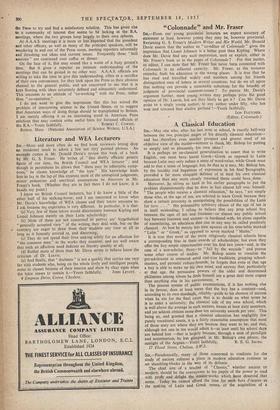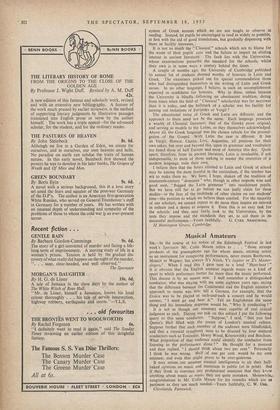SIR,—Paradoxically, many of those concerned to vindicate for the study
of ancient cultures a place in modern education continue to set stumbling-blocks in the way of its defence.
The chief aim of a teacher of " Classics," whether ancient Dr modern, should be the conveyance to his pupils of the power to read with profit and delight the master-works which have deserved that name. Today we cannot afford the time for such hors d'oeuvre as
^ the making of Latin and Greek verses, or the acquisition of a system of Greek accents which we are not taught to observe in reading. Instead, let pupils be encouraged to read as widely as possible, at first with the aid of good translations, but gradually dispensing with them as facility increases. It is not so much the " Classical " schools which are to blame for the waste of their pupils' time and the failure to impart an abiding interest in ancient literature. The fault lies with the Universities, whose examinations prescribe the standard for the schools, whilst their own is in some ways a century behind the times.
A couple of months ago, the University of Cambridge published its annual list of students deemed worthy of honours in Latin and Greek. The examiners picked out for special commendation those who had distinguished themselves in the writing of Latin and Greek verses. In no other language, I believe, is such an accomplishment expected in candidates for honours. Why in these, unless because the University is blindly following an obsolescent tradition, dating from times when the field of " Classical " scholarship was far narrower than it is today, and the hallmark of a scholar was his facility for turning out imitations of Euripides or Vergil ?
The educational value of Greek and Latin are different; and the approach to them need not be the same. Each language possesses a wealth of Classical literature; that of the Greeks more original, and serving as models to the Latins, as they themselves acknowledged. Above all, the Greek language was the chosen vehicle for the promul- gation of the Gospel, With Latin the case is dfferent. It has its Vergil, Horace, Cicero, Livy, Augustine, all precious for their own sakes; but over and beyond this, upon its grammar and vocabulary are based those of half Europe and most of America this day. Quite apart, therefore, from its ancient literature, Latin is invaluable, if not indispensable, to most of those seeking to master the resources of a modern language, even their own.
I believe then that the hours allotted to Latin and Greek at school may be among the most fruitful in the curriculum, if the teacher has wit to make them so. We have, I hope, shaken off the tradition of nineteenth-century ".dominies " who, though in other respeots wise and good men, " flogged the Latin grammar " into recalcitrant pupils. But we have still far to go before we can justly claim for these studies—in the face of the multitude of other claims on our students' time—the position to which we believe them entitled. For the majority of our scholars, we cannot expect to do more than inspire an interest in culture and a desire to acquire it. Even this is no easy task for the schools: and they may fairly look to the Universities, by the tests they impose and the standards they set, to aid them in its successful performance.—Yours faithfully, G. CYRIL ARMSTRONG. 32 Harlington Grove, Cambridge.



































 Previous page
Previous page